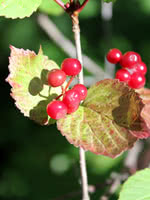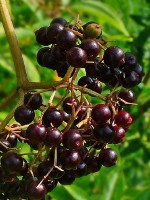Mon-Fri 9am - 5pm Mountain time
Lowbush Cranberry vs Ranch Elderberry
Viburnum edule
Sambucus canadensis Ranch
NOT AVAILABLE THIS SEASON - MIGHT RETURN
NOT AVAILABLE THIS SEASON - MIGHT RETURN
Lowbush Cranberry is a short, deciduous shrub native to North America. Its white flowers bear sour but edible fruit that ripens to a brilliant red in fall. Lowbush Cranberry's small size makes it suitable for urban use; buyers will also find it useful if trying to reclaim land back to its original species or when landscaping with native species in damp conditions.
Ranch Elderberry is a vigorous and high-yielding Black Elderberry cultivar. It ripens earlier than other varieties and is smaller and more compact making berry harvest easier. The berries are well-suited for baked goods, jams, jellies, and syrups. They are high in vitamin C and reported to be beneficial for the immune system.
Black Elderberries are considered to be partially self-pollinating. So while they will still produce some berries without cross-pollination, planting with another variety will increase yields. Consider planting with Black Elderberry or Bob Gordon Elderberry.
Warning: the seeds, stems, leaves, roots, and uncooked berries are toxic to humans when eaten in quantity. Berries should be cooked to make them safe for human consumption.
Lowbush Cranberry Quick Facts
Ranch Elderberry Quick Facts
Toxicity: leaves, stems, and uncooked berries are poisonous to humans

